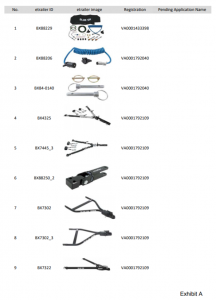Copyright Lawsuits Over Product Shots Are Stupid–eTrailer v. Automatic Equipment
 The plaintiff is a retailer of “motor vehicle accessories.” The defendant manufactures towing supplies and has previously distributed its goods to the plaintiff. The plaintiff created product shots and obtained copyright registrations for some of them. On the right is the first page of a 64 page exhibit from the complaint cataloging product shots and associated copyright registrations. The plaintiff alleges the defendant copied its product shots and used them on the defendant’s own website and in the defendant’s product catalog. Allegedly the defendant asked for permission to reuse the photos and was denied, but took them anyway.
The plaintiff is a retailer of “motor vehicle accessories.” The defendant manufactures towing supplies and has previously distributed its goods to the plaintiff. The plaintiff created product shots and obtained copyright registrations for some of them. On the right is the first page of a 64 page exhibit from the complaint cataloging product shots and associated copyright registrations. The plaintiff alleges the defendant copied its product shots and used them on the defendant’s own website and in the defendant’s product catalog. Allegedly the defendant asked for permission to reuse the photos and was denied, but took them anyway.
Note: it’s relatively unusual for a retailer to sue a manufacturer for infringing product shots. More typically, a manufacturer creates product shots, and retailers or ancillary services (like brokers or consumer review sites) reuse them without express permission. Those reuses create a theoretical risk of copyright infringement but rarely lead to lawsuits because manufacturers anticipate the photo reuse will ultimately produce sales for them. In contrast, the retailer-plaintiff here had less reason to expect that the manufacturer’s resuse of product shots would generate sales for the retailer.
The court acknowledges that the plaintiff’s copyright registrations confer a presumption of validity. The court nevertheless says the plaintiff must show that the defendant copied something original to the plaintiff, and the court proceeds to shit all over the copyrightability of product shots:
the plaintiff (etrailer) did not recite any facts regarding the staging of its photographs, decisions that etrailer made regarding lighting, facts regarding the arrangement of the items in the photographs, the purpose of the background against which the towing part were set, or any other element that would owe its origin to etrailer or its employee, thereby making the work etrailer’s creation—even if etrailer’s degree of creativity was merely slight….
Attached to the plaintiff’s complaint are two exhibits showing what it contends are its works and the associated copyright registration numbers. The works depicted are towing parts and accessories that are stamped with logos of both the plaintiff and defendant. Nothing about the images would allow the Court to conclude that any level of creativity or originality went into the production of the photographs on the plaintiff’s website….
What the plaintiff describes in its complaint as its works are merely accurate photographs of towing parts that are available for purchase through the plaintiff’s website. No facts have been alleged showing any degree of creativity or originality in the photographs, and the exhibits attached to the plaintiff’s complaint reflect photographic images of items for sale that are not unlike photographic images of items for sale on any of a thousand other such retail vendor websites selling a multitude of different products.
If that’s what the presumption of validity looks like, imagine the court’s analysis without such a presumption!
The complaint alleged that the plaintiff “invested significant time and money in creating the photographs,” which the court denigrates as a “sweat of the brow” argument.
I can’t tell if the court dismissed the case with prejudice. If not, the plaintiffs can make the necessary allegations and try again. If dismissal was with prejudice, the decisiveness of this ruling suggests that the defendant should be getting a 505 shift of its attorneys’ fees–and an expensive lesson in the stupidity of product shot lawsuits.
While I like this result, the court unfairly trashes photographers’ efforts when preparing even unremarkable photos. Every human photographer necessarily makes editorial decisions about how to present the subject material, even when the goal is simply to provide a truthful and accurate depiction of goods for sale. (I might feel less strongly about automatically created photos, such as still images taken from a security videocamera). The court’s wobbly application of photo copyright law nevertheless makes complete sense because product shot litigation is so stupid that it deserves to be blown out of court.
Case citation: eTrailer Corp. v. Automatic Equipment Mfg Co., 8:18-CV-351 (D. Neb. April 15, 2019)
Selected Prior Posts on Product Shots:
* Ruling in Emoji Beach Ball IP Case Left Me Confused 
* Amazon Not Liable for Affiliates’ Allegedly Bad Acts–Routt v. Amazon
* Catching Up on 4 Months of Online Copyright Cases–Myxer, Hotfile, Megaupload, Flava Works, Zediva, Blue Nile, Perfect 10, Rojadirecta
* Inflatable Giant Gorilla Attacks Google (for Copyright Infringement)–Scherba v. Google
* Keyword Ad and Product Shots Case Survives Motion to Dismiss–FragranceNet v. FragranceX
* Keyword Metatags and Keyword-Triggered Ads Don’t Create Initial Interest Confusion–Designer Skin v. S&L Vitamins
* Court Says Keyword Metatags Don’t Matter–Standard Process v. Banks
* Yet Another NY Court Says Keyword Ads & Metatags Aren’t TM Use in Commerce–S&L Vitamins v. Australian Gold
